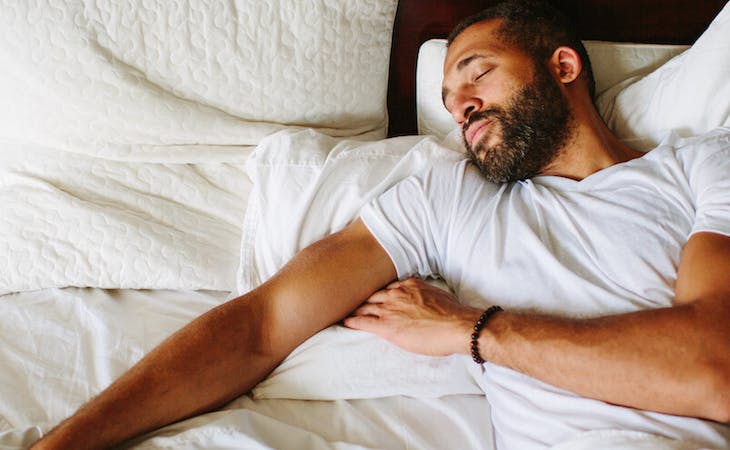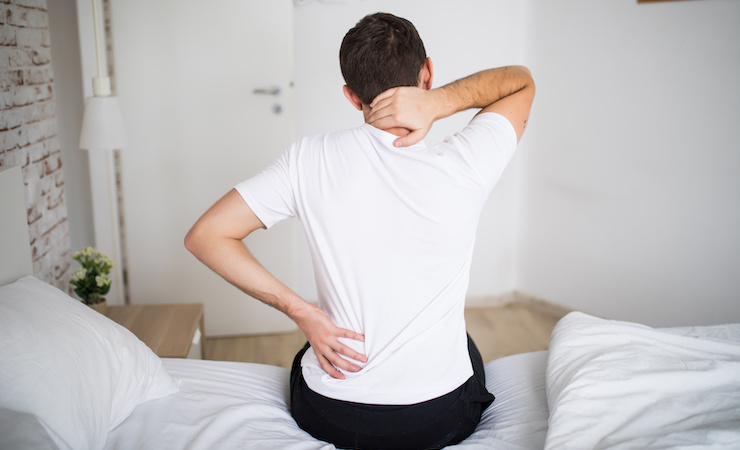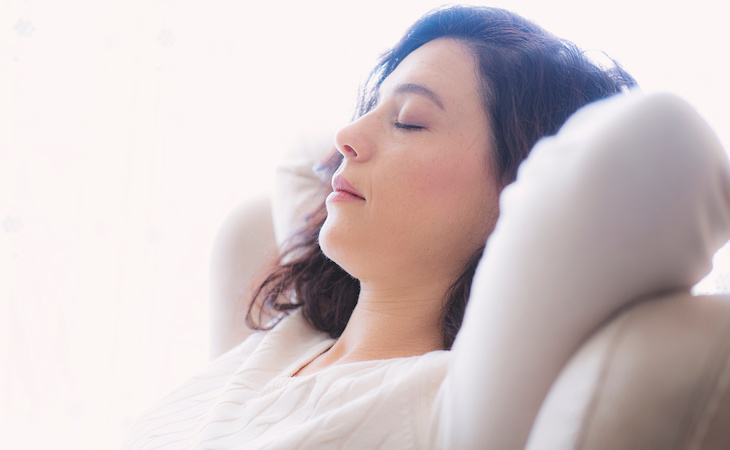Do you struggle to get a good night’s sleep because of your back pain? Back pain is a common issue—and when you throw pain-induced insomnia into the mix, it can be a struggle to get through your day. Let’s take a look at exactly how back pain affects sleep and what sleep positions can help the most.
How back pain affects sleep
Back pain is a common complaint among American adults: 16 million of them experience chronic back pain, with 65 million reporting a recent episode. Back pain is a costly problem and can also make it more difficult to perform everyday tasks, such as exercise, housework, or even sleep.
According to Tom Tozer of Imperium Chiropractic in Wisconsin, back pain can stem from several common causes. “Arthritis of the spine, sprains or strains, poor posture during the day, scoliosis, or overuse,” are some of the most common causes of back pain, he says.
Tozer also points out that back pain can affect the quality of sleep—which, if you have back pain, is something you most likely already know. You may have trouble finding a comfortable sleeping position, be too aware of the pain to relax, or suffer side effects from pain medications. And when you don’t get a good night’s sleep, your back pain may become worse, creating a vicious cycle that’s difficult to break.
Luckily, by favoring certain sleeping positions, you can ease yourself into a good night’s rest.
Best sleeping positions for back pain
“Back and side would be very close as far as proper positions to sleep,” Tozer says. Sleeping on your back can help you make sure that your head, shoulders, and hips are aligned—which, in turn, will support your back and ensure your pain doesn’t worsen. (Here’s how to train yourself to sleep on your back.)
Sleeping on your side can be very comfortable if you experience regular pain, but it’s easy for your spine to become improperly positioned. To remedy this, try using a pillow for support, placing a pillow between your knees to ease the pressure on your back.
You can also place a small pillow under your knees while sleeping on your back. Sleeping in a reclined position with an adjustable bed may even be helpful, although Tozer recommends using an adjustable bed as a stepping stone while you improve your posture. Eventually, you’ll want to move your way back to a normal mattress.
The sleep position you choose will also largely depend on how severe your pain is and what part of your back is affected. For example, if you have a serious or a new back injury, you may have trouble sleeping on a flat surface on your back. In that case, you will have to find another comfortable position that works with the severity of your pain.
Sleep positions to avoid if you have back pain
“We don’t encourage stomach sleeping at all for back pain,” Tozer says. If someone is sleeping on a new, firm mattress, he explains, they might be OK on their stomach. “But if someone’s on a mattress that’s a couple of years old or starting to lose some of its support, if they’re on their stomach that position is going to affect the joints of their lower lumbar spine,” says Tozer.
Beyond stomach sleeping, however, there aren’t any other sleeping positions that are a definite no-go for people with back pain. It’s best to simply experiment and find what works for you.
Best mattress for back pain
The mattress you sleep on plays a huge role in how well you sleep and whether your pain is exacerbated or eased. When you’re looking for a mattress, the most important thing is making sure the mattress is supportive and will help promote correct posture. Look for a mattress with added lumbar support in the center third of the mattress, where most of your body weight lies.
“The second thing is the comfort,” Tozer says. “That’s going to vary some—material, body type, other complicating health factors. That’s where a variety of mattress surfaces, whether it be gel or memory foam or those kinds of things, [can help].”
Your decision on the best mattress for back pain will be influenced by many other preferences and factors too, such as your preferred mattress type and firmness. Just make sure whatever mattress you choose has adequate comfort and support. (Here’s how to find the best mattress for back pain.)
Sleep better with back pain
In addition to finding the correct sleeping position, there are a few other ways you can help ease your back pain at night. Tozer recommends icing for 20-30 minutes before bed and doing some light stretching prior to going to sleep. And it’s also helpful to change sleeping positions every two hours throughout the night, he says, to “help disperse some of the stress to the different tissues of the spine and to allow different areas to rest at different times.”
Finally, says Tozer, it’s essential to seek out the root cause of your back pain and to treat it. “It’s very important to understand where the back pain is coming from,” he says. You can have everything from cancer to kidney stones to sprains/strains to just poor posture or overwork.” It’s important to truly understand the source of your back pain so you can treat it, along with making sure you have proper support and comfort with a mattress. (Find out whether going to a chiropractor can improve your sleep.)
Looking for the right mattress to help alleviate your back pain? Here, learn about the benefits of popular mattress types for your back:
- 4 Ways Innerspring Mattresses Help Relieve Back Pain
- 4 Ways Memory Foam Mattresses Help Relieve Back Pain
- 4 Ways Latex Mattresses Help Relieve Back Pain
- 4 Ways Adjustable Air Beds Help Relieve Back Pain







